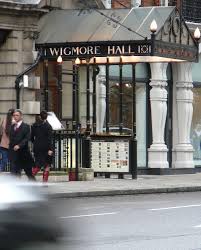Has Wigmore Hall just kicked out the Arts Council?
NewsJohn Gilhooly, who runs London’s Wigmore Hall, today announced a Director’s Fund to cover all contingencies in the coming years.
He said: ‘With £7 million already pledged, we are aiming to reach at least £10 million by 2027, with ambitions to reach £20 million within a decade. We are currently 97 per cent self-funded; this target will allow Wigmore Hall to become 100 per cent self-sufficient, if necessary.’
Mark those words.
Gilhooly has effectively declared independence from Arts Council England. If ACE cuts his funding or makes policy demands, Gilhooly can kick them out without a backwards glance.
There is a new spirit afoot among the independent arts sector, which includes the Wigmore, countryhouse operas and at least one London orchestra. The age of dependancy on state bureaucracy is over. Gilhooly has fired the opening shot of a secession war.






ACE will no doubt spin this as organisations developing diverse and energised funding streams, allowing Wigmore to become independent of public subsidy. So, I’m going to get in early and say my peace.
What it really is, an absolute necessity in this day and age to avoid the stringent, unartistic and frequently non-sensical reporting requirements and investment principles set out by a puppet quango which utterly fails our industry on a near daily basis.
Planning for financial independence of ACE is critical today, because we do not (and cannot) trust that NPO funding will be there tomorrow.
Sorry but for such a tiny venue which doesn’t pay their artists that well, why on earth do they need such a staggering amount of money to survive? Utterly ludicrous beyond belief.
Is most of it going into Mr Gilhooly’s pocket?
According to its accounts it pays artists over £4m a year. Your argument is not valid
I have been told personally by some instrumentalists who have performed there that they get paid anyway between £0 and £600. Which, for a venue that calls itself one of the great halls of the world, is a shameful pittance. Just for the so-called ‘privilege’ and ‘name’.
They need to climb off their high horse and acknowledge that they are no better than two dozen a venue in the UK.
Well there certainly aren’t two dozen halls in the UK that put on concerts at a standard as consistently high as Wigmore Hall, or that have such great acoustics. There’s a reason why all the top artists seem to consistently appear there. Whatever your friends said. I’d imagine the top players who sell the venue out are rewarded well enough.
I’m just guessing, but the cost of doing business in that part of London will not likely be cheap.
This endowment is likely to have a strategy to avoid risk so even if it can generate 5% a year by 2030 from £20m, if inflation is still running at an average of 3% and they intend to protect their capital (and hence keep faith with donors), that would leave 2% a year of disposable income. This would mean there would be some £400,000 a year to contribute to overall costs. Or looked at on a weekly basis, approximately £8,000 a week. And of course £20m in 2030 with inflation running at an average of 3% would be the equivalent of just over £6,600 a week in today’s money. I would imagine that this money isn’t just for underwriting staffing and promotion, there are no doubt demands to invest in customer care and renewals as well as the maintenance of the building if they own it. It’s amazing how quickly the land of milk and honey can become thin gruel.
The goal is an endowment. Only the income can be spent. To these American eyes, where some of the major American orchestras have endowments worth in the hundreds of millions, the amounts being discussed here are pathetic. I have been to Wigmore Hall, and spent some time earlier today salivating over the quality and quantity of the programming, don’t get me wrong.
A going operation that plans ahead is never pathetic. Salivate elsewhere.
When it comes to mounting classical concerts, the Wigmore Hall is one of the most prolific (maybe *the* most prolific) venues in the UK. For 11 months of the year, concerts take place 7 evenings a week (with few exceptions), plus daytime concerts a couple of times per week. Unlike opera or theatre, most of these concerts are “one night only” events (and where a concert *does* take place twice, it is usually involving a superstar performer who is expected to get a full house), which means that the Hall does not obtain the economies of scale that a “run” might elicit.
Is there any other venue in the UK (or indeed anywhere) that delivers the aforementioned, *and* with consistently high artistic standards? If ‘Observing2’ has in mind any comparator in terms of the quality *and* quantity of classical music on offer that does *not* require, in his/her words, a “staggering amount of money to survive”, I am all ears…
Because many of its concerts are poorly attended. The likes of Andras Schiff sell out (deservedly so) but many concerts struggle for a decent sized audience.
Good call. Just make sure the director doesn’t programme anything too radical or experimental to keep the box office humming. Keep calling the Russian oligarchs in London maybe some will toss a few million pocket change.
Wait a minute. Wasn’t this web site full of comments from a certain washed out wannabe composer, husband of a fired trombonist, that argues for full dependence of state funds?
The world is upside down.
It will be another hall offering pop music, crossovers and other junk!!
Why exactly do you think this?
Tickets at the Wigmore are not ‘cheap’ or ‘affordable’ for the average person’s purse – standard price for around half the hall (bearing in mind the seating isn’t raked) is £40 + booking fee. So lack of subsidy does matter, for which this is a consequence.
£40 is usually the top price. They start at around £18, and you get a fine view and acoustics from almost every seat.
I’m not sure that most musicians depend on receiving a fee commensurate with the prestige of the institution when playing at Wigmore Hall. It is usually pinnacle after a number of pre-Wigmore ‘run in’ programmes and are all too happy…honoured indeed to be offered a WH date. It is one of the finest concert halls in the world and a privilege being invited to play there. My first Wigmore recital (1972) cost me £50!
Gilhooly hasn’t fired the first shot in a state funding secession, he’s shot himself in the foot..!
With all this cash swirling around the Wigmore, ACE would be perfectly within their rights to shift that funding to where its more needed. State funding is after all about need, not entitlement. And what if Gilhooly’s endowment is not big enough to sustain the hall? A shortsighted and foolhardy decision.
A small elite concert hall, countryhouse opera (which was never ACE funded anyway with sole exception of Glynditz for their tour & learning), a supposed London orchestra (I’ll believe that when I see it) and a Richard Morrison column in The Times, do not a revolution make.
Especially set against a portfolio of 985 arts organisations who, in the main, appear quite happy with current arrangements.
So please calm down and remember you exist in a very small echo chamber. Classical music does not speak for ‘the arts’.